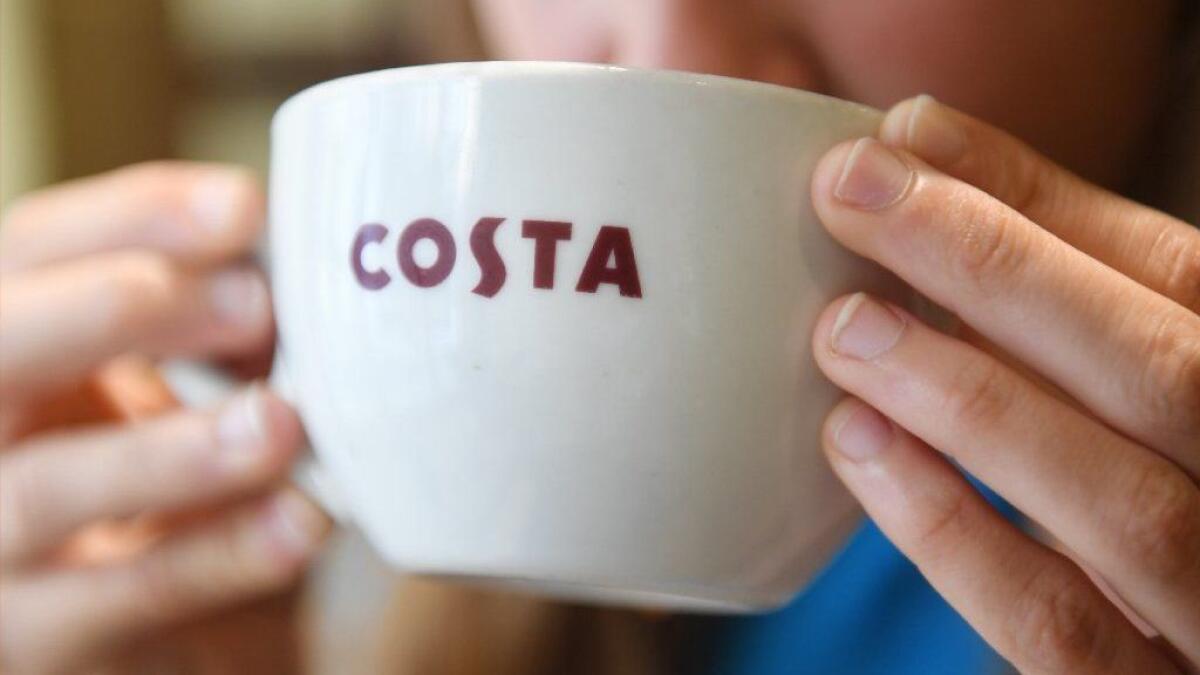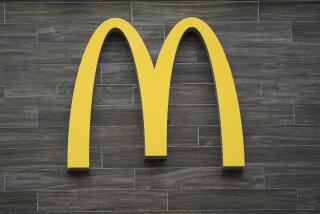Coca-Cola makes a $5.1-billion bet on the coffee market

Coca-Cola Co. is making an audacious move into coffee and retail outlets with the $5.1-billion purchase of British chain Costa, its biggest acquisition in eight years that pushes the soda pioneer into the fiercely competitive java market.
The soft-drinks company swooped in after Whitbread Plc announced a plan in April to spin off the business. The transaction, announced Friday, gives Coca-Cola instant heft in a business from which it was all but absent, with 3,800 stores in 32 countries and a foothold in China. Highlighting Coke’s desire to close the deal, Whitbread Chief Executive Alison Brittain said the two sides signed just minutes before the announcement, after Coke first approached the other party in June.
“It’s been a very fast transaction,” Brittain said on a call with journalists and analysts.
Whitbread investors cheered the deal, with the shares soaring the most in almost two decades, even as Coke shares were muted. A spinoff would have initially yielded smaller returns and might have taken as long as two years.
The Costa deal opens a new business line for a company synonymous with fizzy, sugary beverages such as Coca-Cola, Sprite and Fanta, underscoring the pressure to find new areas of growth as consumer tastes change. Less than two weeks earlier, arch-rival PepsiCo Inc. agreed to buy SodaStream Ltd., a maker of carbonated-water dispensers, for $3.2 billion. Coca-Cola CEO James Quincey said the Costa deal is a “serious and significant investment” in hot beverages, a market that still remains largely fragmented.
Coke’s approach was unsolicited, as the Atlanta company was keen to get a foot in the door before Costa was snapped up by one of the giant players in the coffee business, a person familiar with the matter said. Coke is keen to leverage Costa’s global reach as it becomes a retail brand owner for the first time, the person said.
Quincey touted the benefits of having a retail platform with Costa because it supports the brand and creates growth in “immediate consumption” outlets such as coffee shops in supermarkets and airports. Costa would also be able to expand into ready-to-drink categories using Coke’s expertise and marketing heft, making the two businesses “remarkably complementary.”
Quincey’s plans for Coke could include other international acquisitions as he seeks to revive annual sales and broaden the focus from a single brand, the person said.
Coke is under pressure to establish itself in new markets, with annual sales that have been in decline since 2012. Still, it’s entering the coffee-shop market at a time when competitors such as Starbucks Corp. and JAB have already cornered many key locations.
Coca-Cola shares slipped 0.8% to 44.57 on Friday.
Seller’s shares leap
Whitbread shares rose 14.3%. The company had said in April that it would spin off Costa as an independent publicly traded company, turning its focus to its Premier Inn hotel operations under pressure from activist investors.
The sale will yield a “substantial premium” to the value that would have been created through a spinoff, Whitbread said, adding it will return most of the proceeds to its shareholders.
Whitbread bought Costa in 1995, when it had 39 shops, for about $25 million. Since then, the market in traditionally tea-drinking Britain has boomed. The number of branded coffee outlets in the U.K. rose by 643 to 7,421 in 2017, according to market researcher Allegra Strategies Ltd.
After missing out on the heady growth phase of coffee shops, Coca-Cola is entering when the market in places like the United States and Britain is crowded. Earlier this year, British newspaper the Guardian ran a story titled “Have we reached peak Costa Coffee?”
Costa’s like-for-like sales in the U.K. dropped 2% in the company’s first quarter as the retail market weakened. Consumers in the U.K. are reducing spending due to inflation and concern that Brexit may hurt the economy.
Still, Costa outranks Starbucks in the U.K. — it also operates a business of 8,000 self-service machines — and is expanding in markets such as China.
Acquisition sprees
Costa was one of the few big coffee chains up for sale after Nestle SA and the Reimann family’s investment company JAB both went on acquisition sprees in the segment.
Nestle joined the trend of coffee giants taking aim at smaller niche producers, buying Blue Bottle Coffee and Chameleon Cold Brew. The Swiss food company also paid $7.2 billion to form an alliance with Starbucks that sells products in grocery stores.
JAB added British food-and-coffee chain Pret A Manger in a $2-billion deal this year, following its acquisitions of high-end coffee brands Peet’s and Stumptown. And in another union of the java and soft-drink worlds, this year JAB’s Keurig Green Mountain Inc. bought Dr Pepper Snapple Group for $18.7 billion.
Italian coffee maker Illycaffe SpA has attracted interest from suitors including JAB and Nestle, but the family owners have rebuffed approaches, according to people familiar with the matter.
Coke has dabbled in coffee before, with an unsuccessful attempt at selling java-flavored Coca-Cola Blak. Last year, it started selling Coca-Cola Coffee Plus in Japan and Australia, expanding it to Vietnam this year. The soft-drink giant also sells coffee under the Georgia brand in Japan and has some other local products for specific markets.
Bankers from Rothschild advised Coke, while Whitbread used Goldman Sachs, Morgan Stanley and Deutsche Bank AG.
UPDATES:
2 p.m.: This article was updated with Coca-Cola and Whitbread’s stock movements.
This article was originally published at 7:35 a.m.
More to Read
Inside the business of entertainment
The Wide Shot brings you news, analysis and insights on everything from streaming wars to production — and what it all means for the future.
You may occasionally receive promotional content from the Los Angeles Times.










